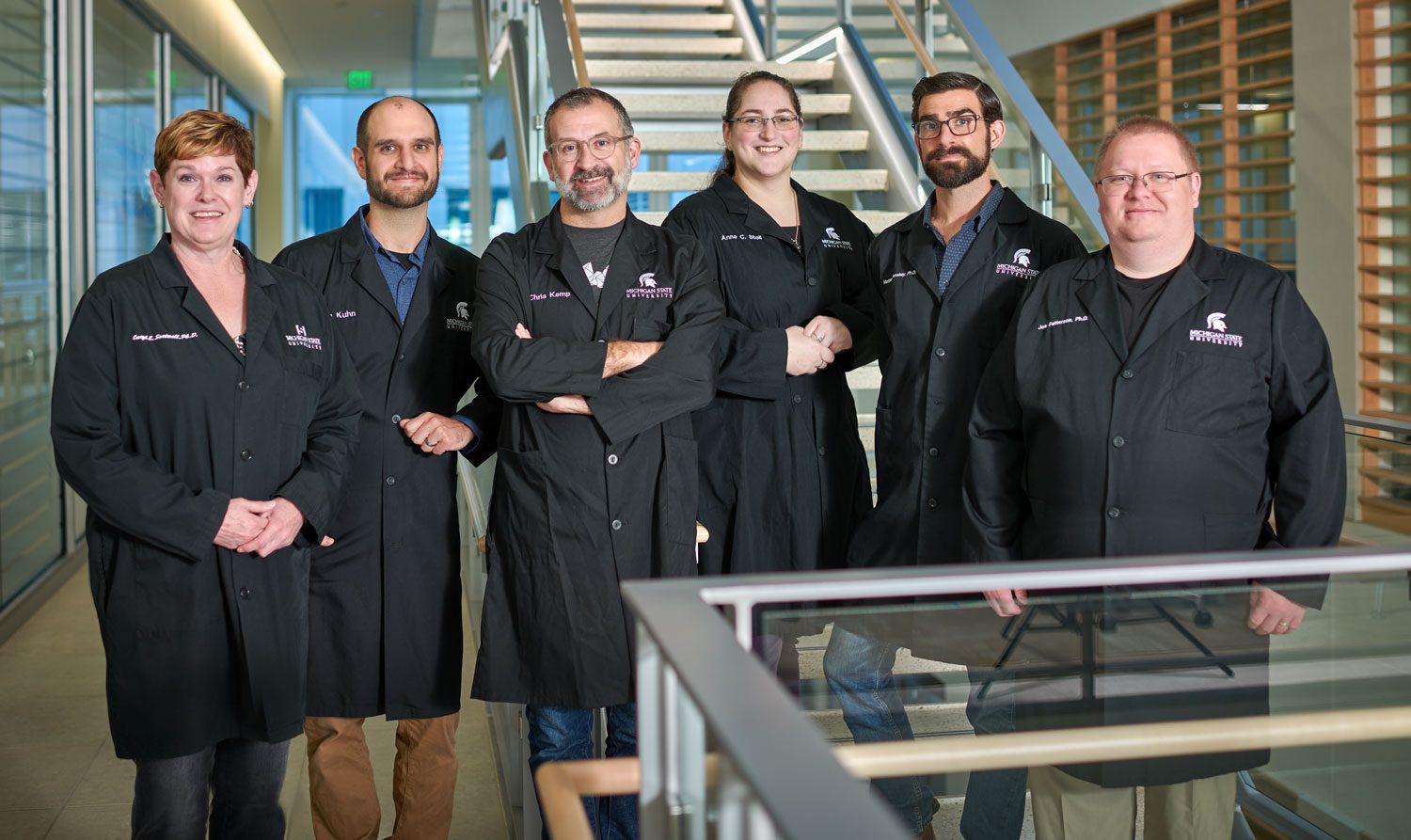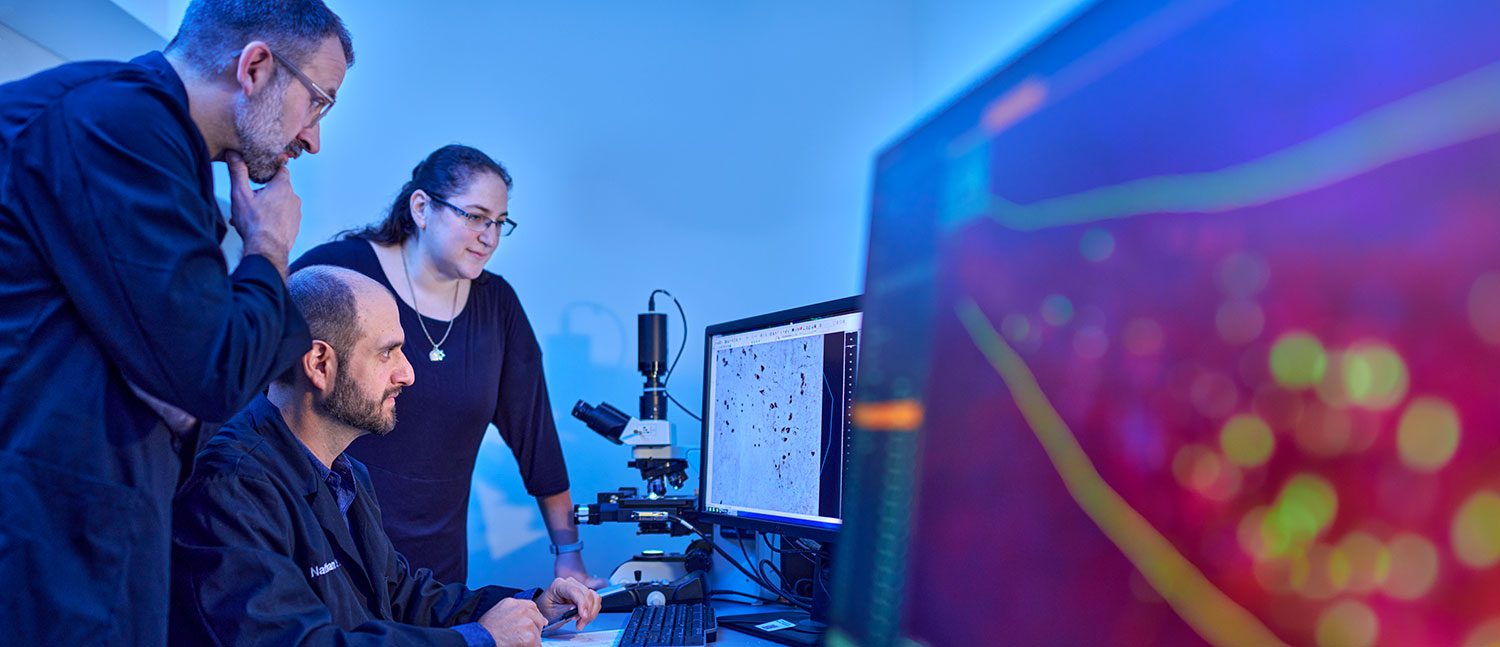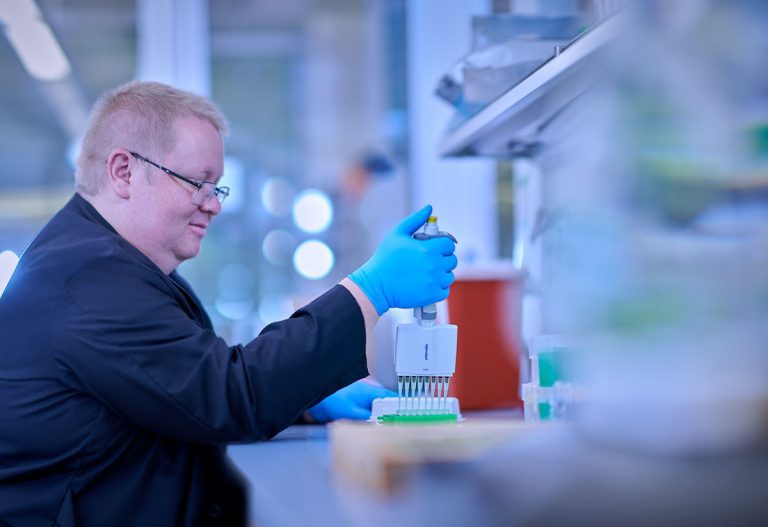“As a Parkinson’s disease neurobiologist, I am trying to uncover causes of Parkinson’s as well as potential treatments to slow or halt the disease,” says Caryl E. Sortwell, Ph.D., Professor of Translational Neuroscience, Department of Translational Neuroscience, in the MSU College of Human Medicine. She also studies ways to optimize the efficacy of therapies that are currently available to treat the symptoms of Parkinson’s disease.

Dr. Sortwell and her team of MSU Translational Neuroscience investigators, Joseph Patterson, Matthew Benskey, Anna Stoll, Christopher Kemp, and Nathan Kuhn, are doing this Parkinson’s Disease research under a collaborative sponsored agreement between MSU and global industry partner Takeda Pharmaceuticals.
Sortwell has studied Parkinson’s disease (PD) since finishing her graduate studies in 1994. Her research had been in using a transplantation, or neural grafting, approach to treat major depressive disorders. At the time, there also was interest in using transplantation for PD treatments, and she found herself migrating toward Parkinson’s research. “I became very enmeshed in understanding that, even though it’s terrible that Parkinson’s is so complicated, it’s also fascinating that it’s so complicated. It stuck with me.” ‘-
According to the World Health Organization, in 2019, there were more than 8.5 million patients worldwide with Parkinson’s disease. The National Institutes of Health (NIH) estimates that Parkinson’s disease affects one to two per 1000 of the population at any time. The incidence of Parkinson’s increases with age; data show that it affects 1% of the population older than 60. It is slightly more prevalent in men than in women.
“It’s a worldwide disease,” says Sortwell. “One of the biggest risk factors is aging, and right now in the U.S., there are a lot of people born in the baby boom years of the 1940s-1960s who are reaching the age of 65. The occurrence of Parkinson’s in that age group is expected to double over the next 15 to 20 years. We’re at a critical point for finding new therapies. “

A partnership is formed
Sortwell’s research partner at Takeda Pharmaceuticals is Marianthi Papakosta, Ph.D., Associate Director in the Neurodegeneration unit within the Department of Neuroscience, with 20-plus years in the pharmaceutical industry working on targets for neurological diseases. In recent years, she has specialized in the areas of Parkinson’s disease, Alzheimer’s disease, and other neurodegenerative diseases that afflict people around the world. Papakosta is currently Global Project Leader pursuing a novel target for neurodegeneration at Takeda and also wished to acknowledge the work of Paul Rolzin, Nicola Broadbent (Ph.D.), and Toni Wolinsky (Ph.D.) fellow colleagues at Takeda in relation to this particular partnership with Sortwell’s group. While there already are a number of drugs on the market that are used for relieving symptoms for neurodegenerative diseases, pharmaceutical companies like Takeda are interested in disease-modifying therapies that go beyond symptomatic relief.

The partnership between the two women started in 2021 when, through their mutual association with the Michael J. Fox Foundation for Parkinson’s Research, Sortwell and her work were recommended to Takeda. Sortwell is one of the Fox Foundation’s advisors and has worked with them for a number of years. “I have a particular niche expertise, which is something that Takeda was looking for,” she says.
Papakosta expands on that: “Caryl is an expert in the preclinical models for Parkinson’s disease. She has a deep knowledge of that and, of course, of the disease. So, we were very happy to be connected with her.”
She continues: “When you are aiming at a particular disease, one of the critical tasks is to ascertain what preclinical animal models we can use to test our compounds to give us the greatest confidence that our efficacy will translate to the clinic. As part of this process, it is necessary to establish that the pathways that our compounds interact with are involved in the disease processes that are characteristic of the preclinical model.
“As such, the goal of this collaboration is to apply and use the very well-characterized preclinical models that Caryl is working on in her lab to test our compounds.”
“From my point of view,” says Sortwell, “it’s exciting because we’ve spent many years trying to optimize these preclinical platforms to get them to a point where they could be leveraged to test novel drugs to see if they’re going to be beneficial for people with Parkinson’s disease.

“So, it was really good timing that Takeda was looking for some of these preclinical platforms at a time when we were able to share a lot of information with them, and they were able to help us optimize and design the experiments that they needed to test their drugs.
“I’m a huge believer in the idea that collectively, we’re smarter. No one person knows everything, and you need to put all these different minds together. That’s what it’s going to take to solve the problem of Parkinson’s disease.”
Putting those minds together was the impetus for implementing a sponsored research agreement between Takeda and MSU.
Putting a research partnership agreement in place
Jeff Myers is Director of Corporate Partnerships for MSU Business Connect, the arm of the MSU Innovation Center that handles negotiation and closing of the contractual agreements that underlie collaborations between the university and industry.
Myers facilitated the agreement inked between Takeda and MSU. “When a researcher has done all the early-stage work using initial funding sources, such as NIH grants, that’s when it is time to get industry involved,” he says. “Especially as a researcher moves closer to a potential treatment that industry might be interested in adopting, partnering with a pharmaceutical company for funding support has benefits for both parties.”

Business Connect is the conduit for such connections, according to Executive Director Nick Miller. “We engage faculty very early in the collaboration process, helping them seek and acquire funding from industrial partners. We act as a contractual business partner and facilitator of the collaboration for all faculty working on industry-sponsored research.”
Adds Myers: “We do everything from small field trial agreements with private industry that might total $10,000 to $12,000 to sponsored research agreements like the one with Takeda, which is close to $800,000 in support.
“Dr. Sortwell has been well funded by NIH and a few other sponsors and was in a position to do later-stage Parkinson’s disease research, which would be logically supported by a company in the industry, to attempt to get closer to something that could be a therapy.”
Myers notes that success is always a long shot in the pharmaceutical business. “Companies don’t allocate funds like this to projects that they don’t think are going to succeed,” he says.
A benefit for the corporate partner in a sponsored agreement can be exposure to diverse talent and expertise in the university system. “Any company who’s working with us in sponsored research or in any other capacity ultimately benefits greatly from engaging with not only faculty, but with the graduate students, and sometimes even undergraduate students involved,” says Miller.
“One reason why we like industrially sponsored research is that it contributes to the university having impact,” he says. “It helps us support our overall research mission. And along with that, it supports graduate student training and education.”
Collaboration fuels reputation, excellence
“MSU has an excellent reputation,” says Myers. “We have an outstanding group of faculty members studying neurodegenerative diseases. Parkinson’s disease and Alzheimer’s are the primary targets of our research from that group. Dr. Sortwell has a terrific reputation for what her lab does. It’s a very active program.”

Papakosta agrees: “MSU has the capabilities, the PIs, the appropriate labs, and the ability to help Takeda answer biological questions that we’re interested in. It’s of great benefit for us to collaborate with extremely smart and capable PIs to be able to test our hypotheses, to see if we can find the right compound that we can progress into the clinic.
“For us, it’s extremely important to find the right partner because it is one thing to have the scientific knowledge and the systems that MSU has, but we also need people that we can collaborate with. The advice and information that we get from such partnerships is priceless.”
Results from the collaboration have been promising and Takeda already has reached the decision to expand the work and provide additional funds, according to Myers.
Success is all about collaboration for Caryl Sortwell, too. “No one person can know or do everything,” she reiterates. “If we are successful, Marianthi’s team at Takeda will move this forward, and hopefully, it’ll get to the clinic and help patients. Our MSU team would be thrilled to be a part of the successful development of a therapy that can slow Parkinson’s disease progression.
“I like to use the analogy of a relay race. The team are trying to get to the endpoint as quickly as possible, but each leg of that race requires a particular skill or expertise, and people are passing the baton to the next expert. My academic research casts a wide net to explore potential therapies, but Takeda’s focus on specific molecular cascades and expertise in drug development has the potential to get us over the finish line as quickly as possible. This will allow us to cross that valley between research and the creation of an effective treatment for people with Parkinson’s disease or other neurological diseases.
The MSU Innovation Center is seeking companies and organizations interested in neurodegenerative disease research, pharmaceutical development, and preclinical testing platforms.
Whether you’re exploring sponsored research, licensing opportunities, or co-developing disease-modifying therapies, preclinical animal models, or drug efficacy testing innovations, we’re ready to collaborate.
Interested in partnering with MSU faculty on translational neuroscience research and next-generation treatments for neurological diseases?

